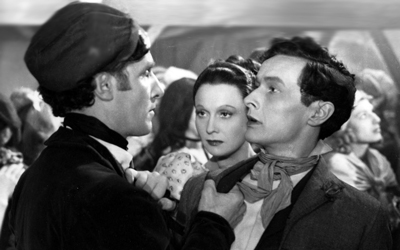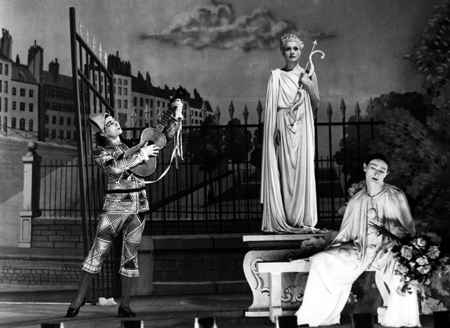
 |
|
|
|
The 2011 Association of Moving Image Archivists convention in Hollywood screened a new restoration of Jacques Prévert and Marcel Carné's Children of Paradise, that for quality far outclassed even the earlier Criterion Collection DVDs. This new release brings that new restoration to Blu-ray, making "one of those movies you're supposed to see but you avoided half your life" into an experience possibly better than that experienced by moviegoers in 1945. Les Enfants du paradis was once best known as Henry Kissinger's favorite film. In Los Angeles, it once played every Christmas day at the late Sherman Torgan's New Beverly Theater. Seen anywhere and in almost any condition, this is a grandly impressive movie experience. 
As sweeping as Gone With the Wind and as literate as a great novel, Children of Paradise is the intellectual's epic, a vast saga that for many represents the screen's most sophisticated depiction of the mystery of romance. In an impressive reconstruction of a lost age four men seek the same elusive woman, whose love means something completely different to each of them. For the beautiful 'free soul' Garance (Arletty) love is something simple, to be given to those who please her. The mime Baptiste Debureau (Jean-Louis Barrault) is consumed with an ideal he sees within Garance, and is tortured because she can't love him back in the same way. Actor Frédérick LeMaitre (Pierre Brasseur) amuses Garance. He doesn't complicate matters as does Baptiste, but he can't hold her either. The megalomanic criminal Lacenaire (Marcel Herrand) boasts contemptuously to Garance that he loves no-one, and that their pairing would unite two superior intellects above the filthy mob. Finally, the nobleman Edouard of Montray (Louis Salou) offers Garance his property and protection, but sets himself up to be despised. Garance eventually has need of her husband's help when she's falsely implicated in Lacenaire's skullduggery. Finally, off to the side in this four-way tug of war is Nathalie (María Casares), who adores Baptiste as deeply as he loves Garance, a cruel trick of fate that spells guilt and pain for all. This all plays out in an incredibly dense and alive Parisienne Boulevard of actors, beggars and criminals. The backstage atmosphere is an whirlwind of tempers and egos that constantly threatens to become a fantasy itself. The entertainments are the dreams of the citizenry brought to life; Baptiste empathizes with the Children of Paradise (the audience in the cheapest seats high in the theater) and is himself is trying to live out his dreams through pantomime. Garance has no morals to guide her passions but believes in beauty. Early on she quits her sideshow job as a nude maiden in a barrel of water, because the spectacle of her beauty inspired ugly responses from her patrons. Like the mythical mermaid who decided to live among people on land, Garance can't help but act as a magical catalyst on the men around her. LeMaitre, fed up with performing pantomimes in a lion costume, cries out to be able to act with his voice. His dream is to be a medium through which the greats of the past can be brought back to life. He wants to speak the words of Shakespeare, even though few on the Boulevard's seem aware of The Bard. "Even Joan of Arc heard voices", rails Frédérick. 
The stage performances frequently comment on the romantic entanglements. Baptiste writes serio-comic mimetic plays; in one he casts his Pierrot-ish clown character as despondent over love for a statue played by Garance. She's wooed away by a troubadour -- played by LeMaitre, of course. The stage plays echo the emotions of the lovers, and vice versa: the love-lost Nathalie refuses to be forlorn, as if replenishing herself with the faith and virtue of her simplistic stage characters. The casting is nothing short of amazing. Jean-Louis Barrault is a great mime, and in costume looks lifted from a period painting. Pierre Brasseur (a mad doctor in the essential Eyes Without a Face) is the initially unlikeable Frédérick. A phony's phony, his passion for theater is more real than his own personality. Yet of all the cast members, he's the least likely to hurt another. María Casares is pure adoration and selflessness as Nathalie, and Marcel Herrand makes a wholly original villain, a master criminal stuck in the squalor and baseness of the 17th century. Arletty is one of the beauties of the cinema; a libertine with a Mona Lisa smile that hides a sincerity of purpose even Greta Garbo couldn't better. Each of these bigger-than-life theatrical characters is played by an actor that can elicit a bigger-than-life emotional reaction. The show is over three hours long and broken up into two separate movies. The Boulevard of Crime establishes the complex world and deftly juggles the love stories. The miracle here is the optimism and hope that mixes with the passions of the characters. We feel that anything is possible, and that these charming people will work out their problems. The first half ends on a cliffhanger that might spell a prison sentence for Garance, simply because her name was dropped by the nefarious Lacenaire. Part Two, The Man in White, leaps forward several years, ignoring the immediate solution to Part One's cliffhanger. Both Baptiste and LeMaitre are successful stars. Frédérick torments his writers and creditors as usual, but has matured somewhat. He wisely allows Lacenaire, now practically a common cutthroat, to extort money from him. Baptiste seemingly has everything going for him. He is married to a beaming Nathalie and has a fine young boy. The return of Garance puts events into a spin. She is now Edouard's consort, but returns nightly to the theater to secretly watch Baptiste perform. Seeing her devotion, Frédérick confesses that he's learned the meaning of jealousy. Edouard becomes wrongly jealous of Frédérick. Learning that Garance is back, Baptiste rushes to throw his new life away for a single night with her. And Lacenaire plans to use the scandal to stage his murderous, final work of 'art'. 
The tone of Part two has left the giddy euphoria of the first half far behind. The Man in White takes place when the characters' futures are no longer unlimited and their spirits no longer unrestrained. Even the villain senses that his grandiose personal plans will soon end on the guillotine. In place of amusing coincidences and chance meetings are personal vendettas and tragic misunderstandings. Baptiste and Garance's opportunity to replay the lost past leads only to more pain. The stage triumphs of both stars (Othello, The Ragman) are now more sophisticated, but they center on negative issues of loss, jealousy, and murder. Even the crowds in the street have changed -- at the end they wear masks and seem to hinder and mock the separated lovers. The fatalism seems all the more powerful after the magic worked in the first half. When the final curtain falls, we've experienced a full spectrum of emotions. 1 Criterion's Blu-ray of Children of Paradise sparkles as never before thanks to Pathé's 2011restoration, which was performed at 4K resolution. According to Criterion's production notes, the extensive, painstaking audio restoration utilized "a patchwork of sources". Some digital restorations result in a quality boost that isn't that apparent, especially if the final BD mastering is indifferent. This restoration is greatly improved in both picture and audio. The feature carries commentaries by Brian Stonehill and Charles Affron. A second Blu-ray disc Criterion's contains the extras both new and old, including a 2009 making-of documentary and a visual essay on the film's designs by Paul Ryan. An older making-of docu by Bob Houver is present as well, along with the full stack of items from the older release, trailers, photos, etc. The documentation does a good job of placing the production in the context of the Nazi occupation of Paris, clearing up misinformation about when the film was actually shot. The screen credit for Alexandre Trauner and Joseph Kosma reads, 'With the Clandestine Involvement of..." Both artists were Jews in hiding, yet contributed to movies being made by Jacques Prévert and Marcel Carné. The DVD notes offer several chilling anecdotes about filming the movie under the Nazis. The most telling story is surely about the dire shortage of food and the starving extras -- when the show required a real feast for a scene, it would all disappear from the tables before the cameras could roll.
On a scale of Excellent, Good, Fair, and Poor, Children of Paradise Blu-ray rates:
Footnote:
1. (Spoiler). What are we to make of the ending? With de Montray murdered and Lacenaire waiting to boastfully confess all to the gendarmes, we can expect that the deranged criminal's 'masterpiece of crime' is to drag everyone else down with him. Garance, who after being protected by Edouard de Montray from being implicated in assault and battery, will surely be suspected of having a hand in his death. Frédérick, argued with him the night before and Baptiste was publicly seen kissing Edouard's mistress. Lacenaire's triumph may be to take all his 'friends' with him to the guillotine.
Reviews on the Savant main site have additional credits information and are often updated and annotated with reader input and graphics. Also, don't forget the 2011 Savant Wish List. T'was Ever Thus.
Review Staff | About DVD Talk | Newsletter Subscribe | Join DVD Talk Forum |
| ||||||||||||||||||